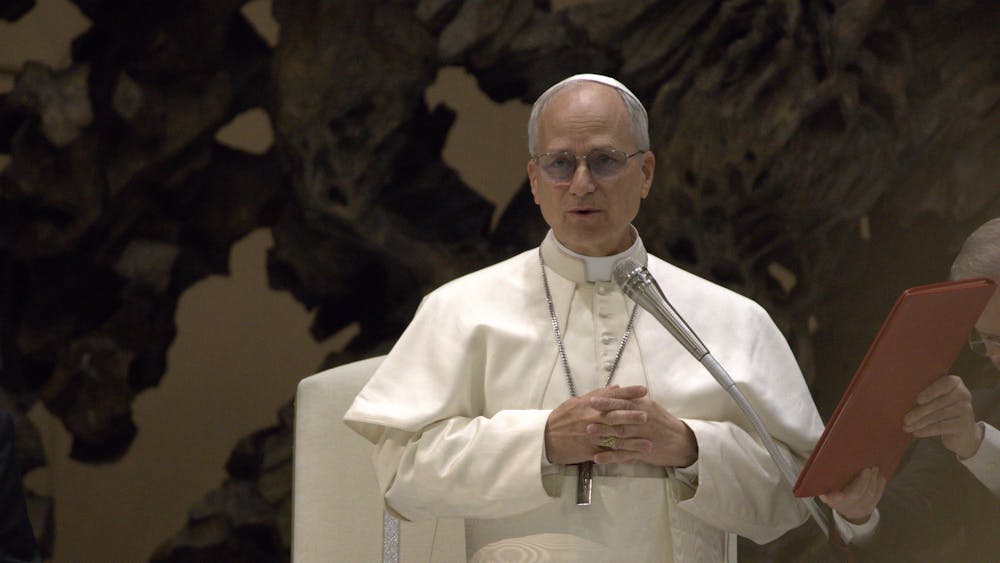On Thursday night, United States Poet Laureate (PLOTUS) Ada Limón visited Saint Mary’s as part of the annual Francis A. McAnaney Humanities Lecture, previously known as the Christian Culture Lecture Series.
Limón was announced as the 24th Poet Laureate Consultant in Poetry to the Library of Congress in July of 2022. Limón was then reappointed for a second term in April of 2023.
Limón is the author of six collections of poetry: “Lucky Wreck,” “This Big Fake World,” “Sharks in the River,” “Bright Dead Things,” “The Carrying” and her most recent work “The Hurting Kind.”
Limón started her time at the college with a private seminar for Saint Mary’s students and faculty, as well as some high school students from the surrounding areas. She began by explaining she was excited to begin her fall tour at Saint Mary’s.
“I feel like this is the seed that will be planted and will keep me going all the way through December,” Limón said.
When asked by a student if poetry exists for the writer or the reader, Limón said that it was both.
“The act of writing itself is one thing, the act of making something for somebody else is another part of craft entirely … so yes, I get something out of it, personally as a writer,” she said. “But then as a reader, I feel like if you’re having trouble living, you should read something.”
Limón went on to talk about how hard it can be to identify as a poet and how intimidating it can be. Although she has always viewed herself as a creative person, Limón associated much of her creativity with whether or not she would be able to make a living off of it, she said.
But, she went on to tell the story of when she was first bold enough to identify herself as a poet.
“I was waiting for a friend at a bar and the bartender asked, ‘What do you do?’ And I just said it — I tried it on for size. I said ‘I’m a poet,’“ Limón said. "It felt so good, and then I said [to myself]: 'Oh, OK, I really want to do this.’”
On her first day as poet laureate, someone from the Library of Congress asked Limón what she wanted her signature project to be.
“My heart was heart was racing, and all of this was brand new to me, and I just said ‘I just want to write poems and save the planet,’” she said. “We all started laughing, but then I was like: ‘OK, well how do I make a signature project that actually can do something about that?’”
However, Limón said she does not think that “everything's going to be solved by thinking.”
“I think a lot of things are going to be solved by community and by feeling or religion,” she said. “We’ve tried to think our way out of a lot of things, and look where we’re at.”
Later that night, Saint Mary’s College President Katie Conboy stepped up to the podium on O’Laughlin Auditorium’s stage to thank special members of the audience and introduce Limón to the audience gathered for her lecture.
Conboy began by explaining her connection to poetry.
“It’s no secret to anyone at Saint Mary’s that I’m a reader of poetry. I did start my career as an English professor, and I am married to a poet, and those that know me are aware that every talk I give, almost everything that I write ends up bringing in a poem,” Conboy said.
After an introduction by Conboy, Limón began by explain what she understood as the relationship between poetry and wisdom.
“Poetry and wisdom are at odds. Poetry tends to resist the idea of answers, and yet I do think some of the best life advice I’ve ever gotten is from poems,” Limón said.
She then discussed the first poem that ever caught her attention: a love poem she read at 15.
“At 15, this poem changed me, and it made me think that there were people out there that knew how to feel, to deeply feel and witness the world, and that gave me a kind of hope,” Limón said. “This isn’t advice. This is the opposite of advice … it’s ironic and smart and tricky. The poem is tricky because life is tricky.”
Limón said that she often gets distracted during the writing process, but that poetry is how she refocuses.
“Poetry is always how I pay attention, and in paying attention we find the strangeness, the ‘you-ness,’ the ‘we-ness,’ the ‘we’re-ness,’” she said.
Throughout her lecture Limón quoted several of her favorite poets, including Lucille Clifton, Elizabeth Bishop and W.S. Merwin. She even read for the audience a new piece written specifically for the event.
Limón swayed to the beat of the poetry as she read. One student in the audience compared the way she read poetry to “the way a mother would read her child a bedtime story. Each poem was a new story she was inviting us to listen to.”
Limón finished her lecture by discussing the power of language.
“It all depends on what we are willing to be open to, to listen to, to read,” Limón said. “To be aware of the powerful exchange of language — to recognize that we are not alone — is a powerful thing. To be open to the hope that connection brings is a radical act of survival.”
Read More
Trending









